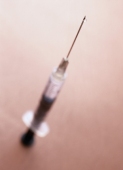- The Best Time of Day to Drink Bone Broth to Maximize Health Benefits
- 8 Ways to Increase Dopamine Naturally
- 7 Best Breads for Maintaining Stable Blood Sugar
- Gelatin vs. Collagen: Which is Best for Skin, Nails, and Joints?
- The Long-Term Effects of Daily Turmeric Supplements on Liver Health
- Could Your Grocery Store Meat Be Causing Recurring UTIs?
- Are You Making This Expensive Thermostat Error This Winter?
- Recognizing the Signs of Hypothyroidism
- 10 Strategies to Overcome Insomnia
- Could Artificial Sweeteners Be Aging the Brain Faster?
Cervical Cancer Vaccine Program in England a Success, Researchers Report


A sharp drop in the number of young women infected with the two strains of human papillomavirus (HPV) most likely to cause cervical cancer occurred in England after the 2008 launch of a national vaccination program there, a new study shows.
The high-risk HPV types 16 and 18 cause 70 percent to 80 percent of cervical cancers. Protection against infection from these two types is included in HPV vaccines.
The British researchers analyzed test results from more than 4,000 young women between 2010 and 2012. Before the start of the HPV vaccination program, about one in five sexually active women aged 16 to 18 had at least one of the two high-risk HPV types. That dropped to one in 15 after the vaccination program began.
The investigators also found that this age group had the highest rate of infection with the two high-risk HPV strains before the start of the immunization program, but had the highest vaccination rate and lowest infection rate once the program began.
The study was to be presented Monday at the Society for General Microbiology annual conference in Liverpool, England. Research presented at meetings should be considered preliminary until published in a peer-reviewed medical journal.
“This study provides an early indication that the national HPV immunization program is successfully reducing vaccine-type HPV infections in sexually active young women in England, and also suggests herd immunity may be benefiting non-vaccinated young women and men,” David Mesher, of Public Health England, said in a society news release.
Herd immunity happens when vaccination of a large portion of a population affords some protection against infection to those in the population who are not vaccinated.
More information
The U.S. Centers for Disease Control and Prevention has more about HPV vaccination.
Source: HealthDay
Copyright © 2026 HealthDay. All rights reserved.










